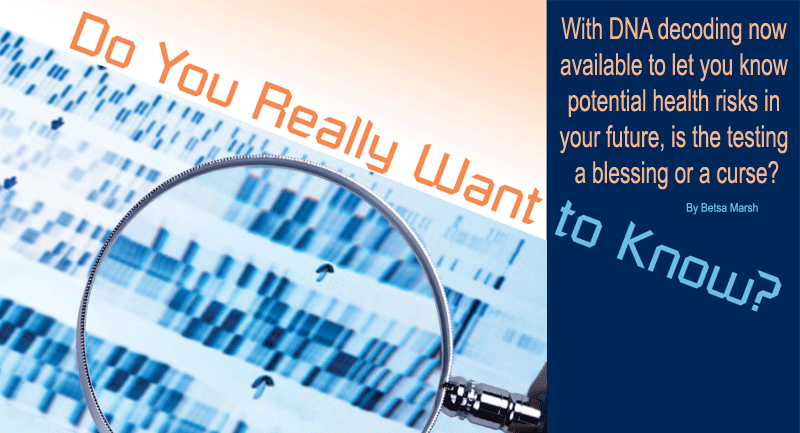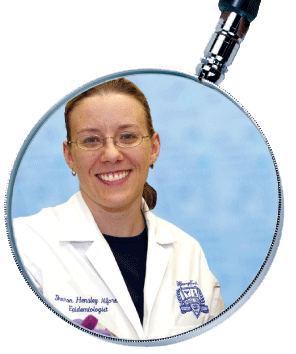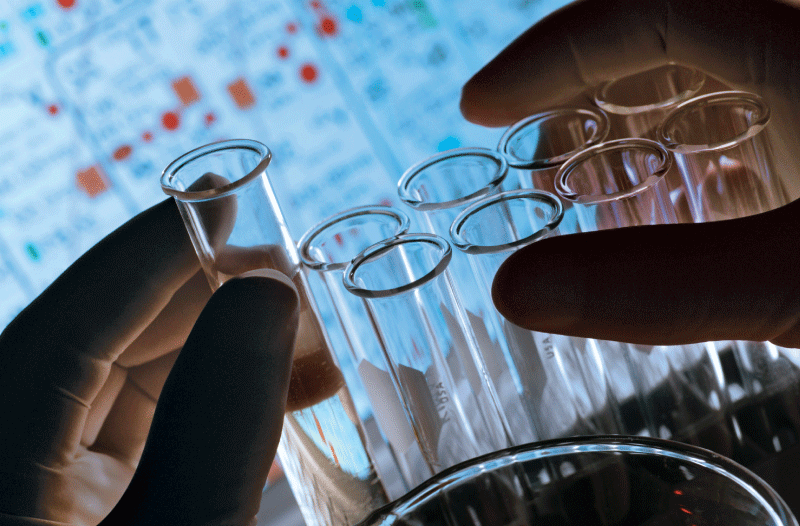
The question is as old as the ancient prophetess Cassandra: If you could peer into the future, would you dare?
Put a medical spin on it and you have the crux of a government-funded research study being led by Sharon Hensley Alford '92. Would young, healthy individuals want to see their DNA decoded, with all the implications about possible medical problems down the road?
Those who've opted for the test "have not had a lot of questions, and that really surprised me," Alford says from her office at the Henry Ford Health System in Detroit. "Or they say, 'The results didn't surprise me - my grandfather died of a heart attack at 47.' "
As lead investigator in the Multiplex Initiative, Alford, an epidemiologist, is among the first to pose such questions in the new interface between human genome research and public health. The human genome was not fully mapped until 2003, yet commercial companies such as 23andme.com already are offering consumers their DNA profiles, revealed through online links to maps of their genetic codes. All it takes is $1,000 and a vial of saliva.
"Technology outpaces a lot of research in terms of delivery of information," Alford says. That's why the National Human Genome Research Institute, National Cancer Institute, Group Health Cooperative of Seattle, and Henry Ford Health System came together for the Multiplex Initiative.
The Multiplex test requires a simple blood draw, which can reveal at-risk variants of 15 genes for eight common health conditions: type 2 diabetes, coronary heart disease, high cholesterol, hypertension, osteoporosis, lung cancer, colorectal cancer, and malignant melanoma. Increased risk levels are generally 10 to 30 percent.
Alford is interested in who among 25- to 40-year-olds served by the Henry Ford Health System will opt for the test, and how those who decide to be tested will handle the findings. Will they become anxious? Or will they use the genetic data about elevated risk to spur behavior change?
With 200 people tested so far, and 13-15 new study participants visiting the clinic each week, Alford says it is still too early to analyze the outcomes.
"From anecdotal observation," she says, "people don't seem to have much anxiety when we do the follow-up meetings, explaining what the results mean. We are working to create a sense of empowerment for people to change their outcome in the long term. If they have a small increase in risk, people might have checkups more often. For behavioral changes, it depends where a person is on the continuum of readiness for change. For the people who are ready, this information may tilt the scale for them."
One subset of study participants seems thrilled with any news.
"People who are adopted said, 'Wow, I'm so glad I can get this. I have no idea about my family history.' "
The study caught the eye of ABC News producers, who aired a segment about it on "World News with Charles Gibson" in August 2007. Miami alumni and professors watched Alford as she discussed DNA testing.
"I was in the kitchen and looked up and saw Sharon," recalls Reginald Fennell, a professor of health education and one of Alford's Miami mentors. "I went into the other room to see her more closely, then jumped up and down screaming.
"I always tell my students, 'I look forward to the day I see you on the news - for something positive.' In the health promotion field, there is such potential to make a difference in people's lives. What a joy for a professor to see this happen with one of his or her students."
Fennell and Sharon Hensley first met when she visited Miami during her senior high-school year in Toledo. Her cousin, Ty Ramsower, was at Miami working on a designated driver/alcohol control program directed by Susan Vaughn, now Miami's director of Ethics and Student Conflict Resolution.
The two cousins and Fennell would meet for meals, and soon Sharon was declaring her major as public health. She and Fennell worked on a film about HIV education, shot at Bowling Green in a talk-show format. "It was a hoot," Alford recalls.
"There was a lot of opportunity there with Reginald to explore whatever ideas for career development I had. Where did I fit in the larger domain of public health?"
As a peer educator, she spoke in classrooms and residence halls about alcohol and other drugs. Fennell spotted her "zest for life," a quality he saw again on the news. "In public health, one has to have the type of energy and presence to motivate others. Some of us come into our own in college. She was already there, very mature, and just grew more so."
 Alford moved into the scholar-leaders residency program her senior year, taking classes and field trips under the tutelage of Dick Nault, vice president for student affairs. Alford moved into the scholar-leaders residency program her senior year, taking classes and field trips under the tutelage of Dick Nault, vice president for student affairs.
"That was phenomenal for me," Alford says. "We talked about our personal passions and gifts, and how we could apply them to the rest of our lives. Some of my best friends still are from that program.
"Miami," she says, "was a fantastic undergraduate experience."
Ramsower, now coordinator of health promotion at California State Polytechnic University Pomona, was a big supporter of his younger cousin during those Miami years; both were first in their families to attend college. "It's a struggle being a first-generation student that far away from home. Miami really provided Sharon a foundation to go on and achieve academically at Michigan."
But before she headed to Michigan, she and her new husband, Dan Alford, made a slight detour - to the Pacific's Solomon Islands and two years in the Peace Corps.
They specialized in rural community education - she working with the village women's group, he with the chief and men's group. It's an experience, she says, "that gives back every day."
After returning from hard, hands-on work in the Third World, Alford was convinced she wanted to specialize in infectious disease. She earned a master's in public health at Michigan in 1999.
After a stint in Chicago that didn't work out, she took the epidemiology job at the Josephine Ford Cancer Center and began work on a doctorate at the University of Michigan School of Public Health.
"I thought, 'I want to do infectious disease, so what am I doing at a cancer center?' Then two months later my sister was diagnosed, so I was at the right place at the right time."
At age 29, Sara Hensley discovered she had Stage 4 breast cancer. "Seven years later," Alford says, "she's still alive, doing fantastic."
"It's a miracle the way it all came together," adds their cousin, Ty Ramsower. "With Sharon's new job, she was able to get her some innovative care."
"I'm extremely motivated to come up with the next answer for her," says Alford, who has written her dissertation on the molecular mechanisms of breast cancer metastasis. "There are crucial unanswered questions in that process. I'm looking at a new technique, to capture circulating tumor cells, run molecular studies on them, and identify some therapeutic targets that would be effective. It's a way to get ahead of the disease."
Which brings Alford full circle to her work on the Multiplex Initiative.
"The landscape of genetic testing is completely different now. If a woman discovers she has the breast cancer gene, BRCA 1 or BRCA 2, she has some clear, hard decisions to make about how she will manage her breast health. These genes mean an 80 percent increase in risk.
"The gene risks in our study, however, are very different. For one thing, they're very prevalent, lots of people have them. It's not a gloom and doom message - the risk might be 20 percent. And they're modifiable. With a marker for heart disease, you can change your diet and exercise and have checkups more often."
In the online feedback to Alford's ABC appearance, some viewers were eager for a DNA kick in the pants. "I would LOVE to take this test," Lucy posted. "It is probably the only thing that could possibly help me stop smoking."
Others immediately foresaw Big Brother implications. "Where are the laws that protect us from insurance companies' demanding we take this test and denying coverage to those who fail?" Brenda posted. "It's fixing to be too late to have that debate."
Miami philosophy professor Rick Momeyer agrees there are ethical dilemmas to be addressed. "Insurance companies could deny coverage, saying any genetic variant is a pre-existing condition," he cautions. "That would be terribly destructive.
"And it's not just an issue of confidentially of these tests. Life insurance companies regularly draw blood from clients, so they can easily do full DNA scans. I can see this happening in the future.
"We might want to have legislation prohibiting using DNA as a requirement for insurance or employment," he continues. "And to prohibit them using this information against people, especially for conditions they can do nothing about. These are not arguments against genetic testing, but they are cautions."
For Momeyer, he'll be writing no $1,000 check to 23andme.com any time soon. "I would not take any such test at this time. I don't think we have good information about what can be done with DNA now. And there's the issue of false positives and false negatives."
As for Alford, with her medical knowledge and family history - would she take the DNA test?
"At first I thought, no, then I sort of changed my mind. For $1,000, I could have my entire genome ancestry, and I wouldn't have to search on [the link to] a certain disease if I didn't want to."
Breast cancer is never far from her thoughts, whether it's her sister's health, her dissertation, or something she recalls from her scholar-leader days at Miami.
"We discussed creative drifting, to test the waters and see the world, trying different things and letting the winds take you where they will. That resonated with me when I came to the cancer center and my sister was diagnosed. The winds wanted me here."

A frequent contributor to Miamian, Betsa Marsh wrote about "Repaying the Righteous" in the Fall 2007 Miamian.
 Back to the Miamian Magazine Spring 2008 Web page Back to the Miamian Magazine Spring 2008 Web page
|